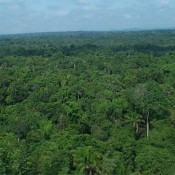Opinion Brazil’s Climate Pledge Is Significant, But Falls Short On Curbing Deforestation
In its recently submitted INDC, Brazil is committing to slashing its emissions rate 37% below 2005 levels but the rainforest nation already achieved the bigger part of that commitment two years ago by reducing deforestation. Here, Steve Schwartzman of the Environmental Defense Fund explains why Brazil should have pledged to deeper cuts in its climate plan.

This article was originally published on the Environmental Defense Fund blog. Click here to read the original.
30 September 2015 | Brazil did the UN climate change negotiations – and hopefully, the planet – some good Sunday when President Dilma Rousseff announced emissions reductions targets in the UN General Assembly. However, it missed an opportunity to do itself and the planet much more good.
President Rousseff deserves credit above all for announcing an absolute, economy-wide, emissions reductions target, rather than reductions below a business-as-usual projection, or a “carbon intensity” target. The goal is a 37% reduction by 2025 and 43% by 2030, both in relation to 2005. She also spoke promisingly of “decarbonizing” Brazil’s economy.
Brazil’s announcement is an important contribution to a successful agreement in the UN climate talks in Paris
Brazil has thus aligned itself with other major emitters, such as the U.S., China and the European Union, which have committed to becoming part of the solution to climate change. And the decision by one of the world’s most important emerging economies to take on an absolute emissions reduction target provides yet another signal that the world has moved on from the Kyoto Protocol approach of dividing the world sharply into “developed” and “developing” countries — a division that has helped lead to deadlock in the negotiations. For both reasons, Brazil’s announcement represents an important contribution to a successful agreement in the UN climate talks in Paris this December.
While the announcement did not go into detail, it is clear that these targets can only be met if Brazil sustains the 80% reduction in Amazon deforestation by 2020 in its National Climate Change Policy, passed by Congress in 2009.
Beyond this, the devil-in-the-details starts to show his face.
First, as some reactions have noted, Brazil is taking credit for reductions it has already made. It certainly deserves credit for those. But a 37% reduction compared with emissions from 2005 doesn’t sound quite as ambitious when you consider that Brazil already reduced its national, economy-wide emissions by 35% from 2005–2013, all from reducing Amazon deforestation. In other words, the projected emissions to 2025 compared to 2012 emissions shows a reduction around 2%. Certainly this goal would be an improvement compared with Brazil carrying on with business as usual, where emissions would be expected to grow by 2025. But as an absolute target – below actual historical emissions – this is beyond modest.
Brazil already reduced its national, economy-wide emissions by 35% from 2005–2013, all from reducing Amazon deforestation. The new target is little more.
Second, President Rousseff reiterated her pledge to achieve zero illegal deforestation in the Brazilian Amazon by 2030. But a recent study by Brazil’s National Space Research Institute (INPE) concludes that full implementation of the Forest Code (including restoration of degraded lands) would itself result in zero deforestation by 2030. That target also ignores other major forested, high-deforestation biomes, in particular the savanna (Cerrado).
Environmentalists – in fact, most people (84% by a recent poll) – in Brazil don’t think tolerating illegal deforestation until 2030 is a good idea, and for good reason. If deforestation is not extinguished in the next few years, the combination of global climate change and deforestation will lead to severe local changes in the climate.
Such changes in the climate are already occurring in Brazil’s Xingu river basin. A new study by Divino Silvério, a scientist at Amazon Environmental Research Institute (IPAM) shows that in the Xingu, the temperature has already risen four degrees Celsius (7.2 degrees Fahrenheit) between 2000 and 2010 as a consequence of deforestation.
Recent research suggests that the combination of climate change and deforestation, if unchecked, will disrupt rainfall patterns, reduce agricultural productivity, and may lead to the large-scale transformation of forests into savannas.
Most Brazilians think Brazil can and should do more to stop climate change.
Please see our Reprint Guidelines for details on republishing our articles.

